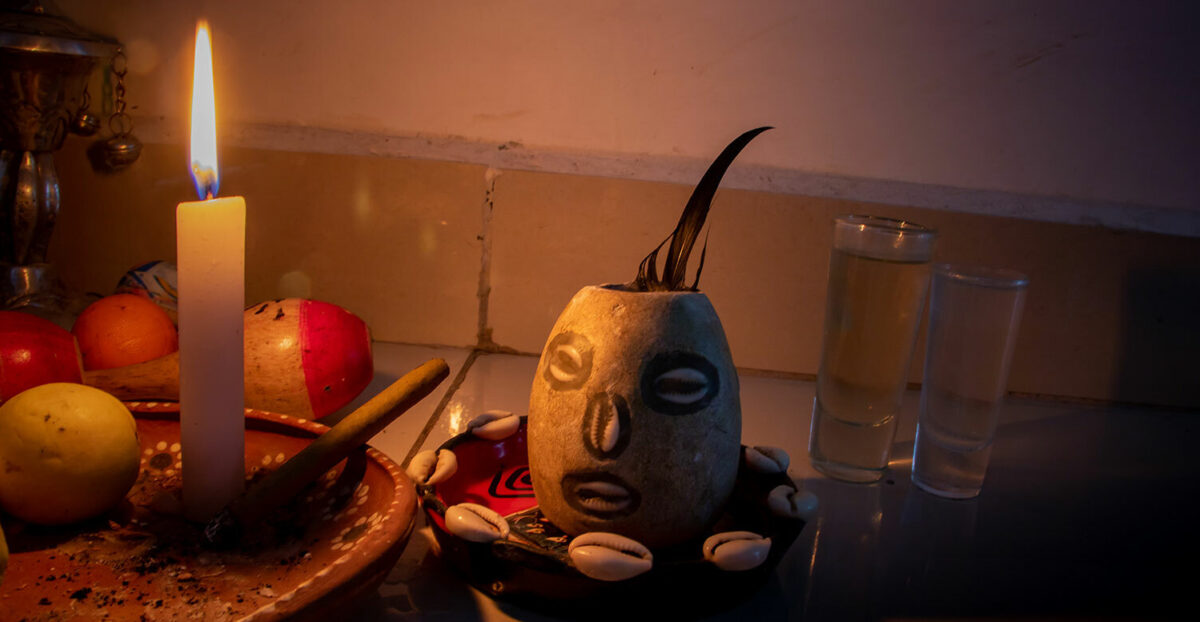
How Long Does It Take For a Ritual or Spell to Work?
When it comes to spiritual rituals, it's not always easy to know when to expect results. Whether you're performing a candle ritual, a spiritual bath, or another type of ritual common in Santeria, Yoruba, and other West African religions, there are many factors that can impact the timing of results. In this article, we'll explore some of these factors and provide guidance on how long you should wait to see results from your ritual.
The Complexity of The Ritual
The complexity of the ritual can significantly impact the timing of the results. More complex rituals may take longer to manifest results compared to simpler rituals. The timing of results from a ritual can vary depending on the complexity of the ritual and the individual's connection with the divine.
Simple Rituals: A Few Days to a Week
Simple rituals involve minimal tools and are usually performed to manifest a relatively simple desire. For example, a simple ritual in Yoruba may involve offering a single item to an Orisha, such as a white candle to Oshun to bring love into one's life.
In Santeria, a simple ritual may involve offering a single item to a Catholic saint, such as lighting a red candle for St. Expedite to bring financial abundance. In Wicca or Paganism, a simple ritual may involve lighting a candle and burning some herbs to attract positive energy. Some examples of simple ritual requests include:
- Finding a lost object
- Removing a minor obstacle or blockage
- Improving communication in a relationship
- Attracting a new friend or acquaintance
- Attracting positive energy or good luck
- Passing an exam or interview
Moderate Rituals: A Few Weeks to a Month
Moderate rituals involve a few tools and may require more time and effort to perform. These rituals may be performed to manifest a desire that is more complex than what a simple ritual can address. For example, a moderate ritual in Yoruba may involve offering multiple items to an Orisha, such as food, flowers, and other offerings, while reciting prayers and performing a dance.
In Santeria, a moderate ritual may involve offering multiple items to an Orisha or saint, while reciting prayers and performing a dance. In Wicca or Paganism, a moderate ritual may involve casting a circle, calling upon multiple deities, and performing a spell. Some examples of moderate ritual requests include:
- Attracting a romantic partner
- Resolving a conflict with a family member or friend
- Improving finances
- Finding a new home, selling your home, or moving to a new location
- Overcoming a fear or phobia
- Attracting success or recognition in a specific area
Complex Rituals: Several Months or Longer
Complex rituals involve multiple tools and may require significant time and effort to perform. These rituals may be performed to address a desire that is very complex or challenging. For example, a complex ritual in Yoruba may involve creating an elaborate altar for an Orisha, with multiple offerings, such as food, flowers, and other items, while reciting prayers and performing multiple dances.
In Santeria, a complex ritual may involve creating an elaborate altar for an Orisha or saint, with multiple offerings, while reciting prayers and performing multiple dances. In Wicca or Paganism, a complex ritual may involve creating an elaborate altar, casting a circle, invoking multiple deities, and performing a ritual that may span multiple days. Some examples of moderate ritual requests include:
- Healing a chronic illness
- Resolving a long-standing legal dispute
- Overcoming addiction or self-destructive behavior
- Finding a new career path or fulfilling life purpose
- Healing past trauma or emotional wounds
- Reuniting with a lost loved one
It's important to keep in mind that the expected timeframe for results can vary depending on many factors, including the individual's level of faith and connection with the divine, the strength of their intention, and the complexity of the request. Additionally, external factors such as the alignment of the planets or phases of the moon can also impact the manifestation of results.
To maximize the effectiveness of a ritual, it's important to set realistic expectations and remain patient and faithful during the waiting period. Seeking guidance from a trusted spiritual practitioner or community can also clarify the expected timeframe for a specific request. Remember to stay grounded in your faith and trust in the divine timing.

The timing of results from a Yoruba ritual depends on the complexity of the ritual and the strength of the individual's connection with the Orishas.
The Individual's Spiritual Practice
An individual's spiritual practice can also impact the timing of results. Those who have a well-established spiritual practice and perform rituals regularly may see results more quickly than those who are new to ritual work.
Yoruba Rituals
In the Yoruba religion, rituals are used to connect with the Orishas, or divine spirits. Rituals are often performed to seek blessings, protection, and guidance from the Orishas. The timing of results from a Yoruba ritual can vary depending on the complexity of the ritual and the strength of the individual's connection with the Orishas. For example, a simple ritual involving offerings to an Orisha may manifest results within a few days, while a more complex ritual involving multiple offerings and prayers may take several weeks or months to manifest results.
Santeria Rituals
Santeria is a syncretic religion that combines elements of the Yoruba religion with Catholicism. In Santeria, rituals are used to connect with the Orishas and Catholic saints. Rituals are often performed to seek blessings, protection, and guidance from the Orishas and saints.
The timing of results from a Santeria ritual can vary depending on the complexity of the ritual and the strength of the individual's connection with the Orishas and saints. For example, a simple ritual involving offerings to an Orisha or saint may manifest results within a few days, while a more complex ritual involving multiple offerings and prayers may take several weeks or months to manifest results.
Catholic Rituals
In the Catholic faith, rituals are used to connect with God and seek blessings and guidance. Rituals are often performed in the form of prayer, meditation, and sacraments. The timing of results from a Catholic ritual can vary depending on the individual's level of devotion and the strength of their connection with God. For example, a simple prayer may manifest results within a few days, while more complex rituals such as the Novena may take several weeks or months to manifest results.
Hoodoo & Voodoo Rituals
The expected timeframe for results in Hoodoo and Voodoo spells can vary depending on the complexity of the spell, the strength of the intention, and the skill level of the practitioner. Simple rootwork spells, such as those involving candle magic or a simple mojo or gris-gris bag, may manifest results within a few days or a week.
More complex spells, such as those involving multiple ingredients or a series of steps, may take several weeks or even months to manifest results. Additionally, some practitioners believe that certain spells are more effective during certain phases of the moon or on specific days of the week.
Wicca & Pagan Rituals
In Wicca and Paganism, rituals are used to connect with the divine and manifest desires. Rituals are often performed to celebrate the changing of the seasons, honor ancestors, or seek guidance and protection from deities. The timing of results from a Wiccan or Pagan ritual can vary depending on the complexity of the ritual and the individual's connection with the deities. For example, a simple ritual involving a few herbs and candles may manifest results within a few days, while a more complex ritual involving multiple tools and deities may take several weeks or months to manifest results.

If the intention behind the ritual is to purify a space or remove negative energy, the timing of the results may be more immediate.
The Intention Behind the Ritual
The intention behind the ritual can also impact the timing of the results. If the intention behind the ritual is to attract something, such as love or abundance, the timing of the results may depend on external factors beyond the individual's control. For example, if the individual is seeking to attract a romantic partner, the timing of the manifestation may depend on when that partner is ready and available to enter a relationship.
On the other hand, if the intention behind the ritual is to purify a space or remove negative energy, the timing of the results may be more immediate. This is because these types of rituals typically involve clearing away negative energies and creating a clean slate for positive energies to flow in.
It's important to note that while the intention behind the ritual is important, it's also essential to have a strong and focused intention. This means being clear and specific about what is being sought from the ritual and visualizing the desired outcome in detail during the ritual.
In addition, the level of faith and belief in the ritual can also impact the timing of results. If the individual truly believes in the power of the ritual and has faith in its ability to manifest results, the manifestation may occur more quickly than if the individual has doubts or reservations about the ritual's effectiveness.
Overall, the intention behind the ritual, the level of focus and faith, and external factors beyond the individual's control can all impact the timing of the results. It's important to approach each ritual with an open mind, strong intention, and faith in the process, while also remaining patient and understanding that the timing of results may vary.

Simple spells may manifest results in a matter of days, while more complex spells may take several weeks or even months.
Examples of Rituals and Expected Timeframes
There are many different types of rituals in Santeria, Yoruba, Catholicism, and Wiccan and Pagan faiths, each with its own expected timeframe for results. Some common examples include:
Candle Rituals
Candle rituals are one of the most popular types of rituals and are often used to attract love, abundance, or spiritual growth. The expected timeframe for results can vary depending on the complexity of the ritual and the strength of the intention. Simple candle rituals may manifest results in a matter of days, while more complex rituals may take several weeks or months.
Spiritual Baths
Spiritual baths are often used for purification or healing. The expected timeframe for results can vary depending on the strength of the intention and the individual's spiritual practice. Some individuals may see results within a day or two, while others may need to repeat the ritual several times before seeing results.
Spellcasting
Spellcasting is a fundamental practice in Wicca and Paganism, and it involves using herbs, crystals, and other tools to manifest intentions. The expected timeframe for results can vary depending on the complexity of the spell and the strength of the intention. Simple spells may manifest results in a matter of days, while more complex spells may take several weeks or even months.
Novenas
A Novena is a Catholic prayer that is repeated over the course of nine days, usually in petition for a particular intention or to seek guidance from a saint. The expected timeframe for results is typically around nine days, but it may take longer depending on the individual's level of devotion.
Other Rituals
There are many other types of rituals used in Santeria, Yoruba, and other religions, each with its own expected timeframe for results. For example, using an Ibeji doll may manifest results within a few weeks, while more complex rituals involving multiple spiritual tools may take several months.

The expected timeframe for the results of a candle ritual can vary depending on the complexity of the ritual and the strength of the intention.
The Role of Consistency and Repetition
Consistency and repetition play a vital role in the manifestation of results from spiritual rituals. Regularly performing a ritual helps to build energy and momentum toward the desired outcome. Consistency also allows an individual to refine their spiritual practice and build a deeper connection with the divine. Repetition is particularly important when performing complex rituals or when trying to manifest significant changes in one's life.
To incorporate consistency and repetition into your spiritual practice, consider setting a regular time and place for your ritual work. You may also want to create a dedicated altar or sacred space to help you stay focused and centered during your ritual.
How To Spot Signs of Your Ritual's Results
There are several signs that may indicate that a ritual has worked, including dreams or visions, seeing signs or symbols related to the intention, feeling a sense of peace or clarity, and receiving unexpected opportunities or gifts.
On the other hand, signs that a ritual has failed may include feeling disconnected from the intention, experiencing negative emotions or events, or feeling that the ritual did not resonate with the individual.
One additional factor to consider when interpreting signs of success or failure is the concept of spiritual interference. Spiritual interference can occur when outside forces, such as negative energies or entities, interfere with the intention and energy of the ritual. This interference can manifest in a variety of ways, including feeling drained or exhausted after performing the ritual, experiencing unexpected negative events, or feeling that the ritual did not have the intended effect.
If signs of interference are present, it may be necessary to perform additional rituals or seek the guidance of a trained spiritual practitioner to remove the interference and restore the intended energy of the ritual.
It's important to approach signs of success or failure with an open mind and to be patient and persistent in the pursuit of the desired outcome. Trusting in the power of the ritual and the guidance of the spiritual practitioner can help to strengthen the intention and energy of the ritual and increase the likelihood of success.

To manage expectations, consider setting realistic goals and intentions for your ritual work.
Managing Expectations and Staying Open to Possibilities
One of the most challenging aspects of spiritual ritual work is managing expectations and staying open to possibilities. When performing a ritual, it's important to avoid becoming too attached to a specific outcome and to stay open to the possibility of unexpected or different results.
To manage expectations, consider setting realistic goals and intentions for your ritual work. Instead of focusing on a specific outcome, focus on cultivating positive energy and building a stronger connection with the divine. This can help you stay open to the possibility of unexpected or different results while also maintaining a positive and motivated mindset.
Staying positive and motivated during the waiting period can also be challenging. To stay positive, consider incorporating self-care practices such as meditation, exercise, or journaling into your routine. These practices can help you stay centered and focused while also reducing stress and anxiety.
In addition to self-care, it's important to stay connected with a supportive community. Seek out other individuals who practice spiritual rituals and share your experiences and challenges with them. This can help you stay motivated and inspired while also providing an opportunity to learn from others.
Performing spiritual rituals is an important aspect of many people's spiritual practices. However, it's important to understand that the timing of results can vary depending on many factors. By understanding these factors and incorporating consistency, repetition, and patience into your spiritual practice, you can increase your chances of manifesting your desires and connecting with the divine. Remember to manage your expectations, stay positive, and seek support when needed. With time and practice, you can cultivate a deeper connection with the divine and manifest your desires in a way that aligns with your highest good.













